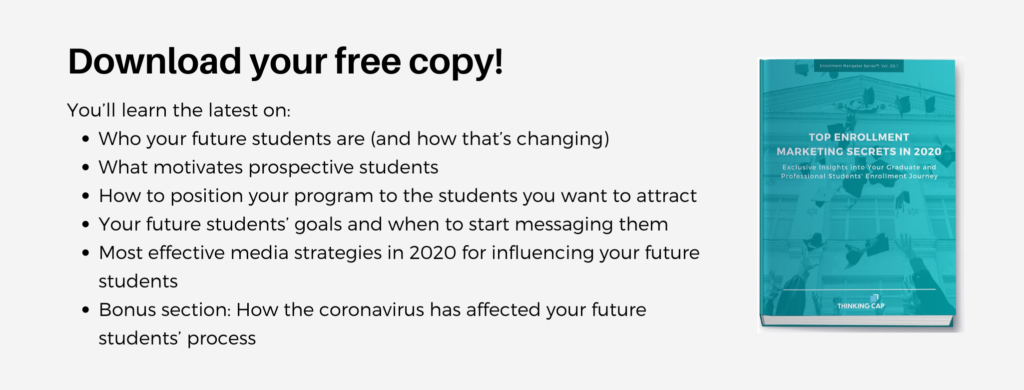Anyone responsible for recruiting graduate students knows the challenge of reaching this diverse group of students. While traditional undergraduates tend to fall in a certain age range and phase of life, graduate students are more diverse and therefore more difficult to target. That’s why we invest in leading graduate recruitment research to help you identify your prospective graduate students, truly understand who they are, and use these graduate school recruitment strategies that drives results.

Read next: How Coronavirus Impacts Students’ Decisions on Higher Ed
Understand who your future graduate students are
The first step to any winning graduate recruitment strategy is to understand who, exactly, your future students are. This will enable you to target them more effectively, and to best understand the steps that come next.
There are more adult learners returning to higher ed than ever before — in fact, the number of graduate students enrolling in grad programs is up 38% since 2000. And as you can imagine, graduate students come from a wide range of ages and backgrounds. Many of these students are married, have families, and have started their careers. They’re busy, they’re motivated, and they’re very focused on exactly what your programs have to offer.
Research your future students’ research
Your future students are looking for you. Once they decide they want to attend grad school, they typically begin narrowing their criteria and researching graduate programs between six months and two years in advance. That’s a large window for your enrollment management team to influence your future students!
Many graduate students are also researchers by nature, and they’re trying to determine whether your school is right for them. Graduate education is both a big time and financial commitment, so your future students have determined criteria for your program. That’s why understanding your future students is so important — you need to anticipate their questions before they have even asked them in order to influence their decision.
Find out what is motivating your future graduate students
While most traditional undergraduates attend college after graduating from high school, your grad students have varying motivations for returning to higher education. Understanding these motivations is a key step towards influencing your prospective students’ final decision.
Remember, graduate students are adult learners with busy lives. They’re often driven to return to higher education by significant life changes, or by changes in their career. The workplace can be competitive, and many adult learners are looking to get ahead. Other significant life changes, like having children or buying a house, can trigger a return to school.
Use the media strategies that best influence your future graduate students
When recruiting students for graduate programs, it’s crucial to understand which media and marketing strategies have the biggest impact on your prospective students. There are so many ways to reach your future students, from traditional direct mail to innovative digital strategies and social media. So what media tactics are actually worth your time and money?
Find out more details about these graduate school recruitment strategies from our extensive research by downloading our free ebook! We’re here to help you build a winning recruitment strategy today.





